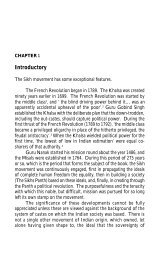Fundamentalism and the Sikh Religious Tradition by T.N. Madan
Fundamentalism and the Sikh Religious Tradition by T.N. Madan
Fundamentalism and the Sikh Religious Tradition by T.N. Madan
You also want an ePaper? Increase the reach of your titles
YUMPU automatically turns print PDFs into web optimized ePapers that Google loves.
It is significant that whereas no earlier religious system in India prescribed,<br />
much less took specific measures to practise <strong>the</strong>m, it was Guru Nanak who both<br />
emphasized <strong>and</strong> implemented <strong>the</strong>se four <strong>and</strong> allied religious doctrines <strong>and</strong><br />
responsibilities. Historically, Guru Nanak appeared in a l<strong>and</strong> with a dichotomous<br />
religious tradition that recommended personal salvation, with hardly any concern for<br />
social morality, as concluded <strong>by</strong> Maitra in his study of Hindu ethics. It is for <strong>the</strong> reason of<br />
this background, that Guru Nanak had to introduce <strong>the</strong> system of succession. Guru Arjun<br />
continued it, even after <strong>the</strong> compilcation of <strong>the</strong> Scripture, <strong>and</strong> Guru Gobind Singh, after<br />
<strong>the</strong> creation of <strong>the</strong> Panth, closed it. It is important that <strong>the</strong> system of Miri-Piri or Sant-<br />
Sipahi, as is <strong>the</strong> case of Moses <strong>and</strong> Prophet Mohammad, was actually practised <strong>and</strong> lived<br />
<strong>by</strong> <strong>the</strong> Gurus <strong>the</strong>mselves, so that <strong>the</strong>re is no misunderst<strong>and</strong>ing or ambiguity about Guru<br />
Nanak's system. As explained <strong>by</strong> us, so far as <strong>the</strong> contemporaries of <strong>the</strong> Gurus <strong>and</strong> <strong>the</strong><br />
<strong>Sikh</strong>s were concerned, <strong>the</strong>re was never any misunderst<strong>and</strong>ing about <strong>the</strong> unity of <strong>Sikh</strong>ism,<br />
its independent identity <strong>and</strong> <strong>the</strong>ology. It is only <strong>the</strong> present-day scholars, mostly votaries<br />
of dichotomous religions, often politically oriented, who sometimes feel confused <strong>and</strong><br />
misrepresent its unity of ideology.<br />
It is an important fact of history that Pir Budhu Shah, a Sufi Muslim sacrificed<br />
two of his sons, while <strong>the</strong>y were fighting in <strong>the</strong> army of Guru Gobind Singh." Had <strong>the</strong><br />
Sufi not been deeply impressed <strong>by</strong> <strong>the</strong> spiritual cause <strong>the</strong> Guru had been fighting for, it is<br />
unthinkable that he would have sent practically all his sons <strong>and</strong> men to fight for <strong>the</strong> Guru<br />
while a Muslim Emperor had been ruling in Delhi. Pir Budhu Shah was not a mercenary,<br />
but a pious <strong>and</strong> respected religious divine above temptation of material or secular gains.<br />
Evidently, <strong>Sikh</strong>ism is a whole-life religion. A radical departure from <strong>the</strong> earlier<br />
religous systems was made <strong>by</strong> Guru Nanak. No doctrinal addition was made <strong>by</strong><br />
subsequent Gurus. Only those ignoring <strong>the</strong> religious history of man, could find dual parts,<br />
or a split between <strong>the</strong> system of Guru Nanak <strong>and</strong> that of Guru Hargobind <strong>and</strong> <strong>the</strong><br />
subsequent Guru. In fact, it is <strong>the</strong> only religion in India which, instead of seeking<br />
personal salvation presents an evolutionary view, involving <strong>the</strong> spiritual growth of <strong>the</strong><br />
manmukh or <strong>the</strong> egoist to that of gurmukh or superman who will play <strong>the</strong> same role as<br />
did <strong>the</strong> Gurus, being <strong>the</strong> instruments of God.<br />
II. THE PUNJAB PROBLEM<br />
While ignorance of <strong>Madan</strong>, because of <strong>the</strong> lack of <strong>the</strong> necessary background of<br />
<strong>the</strong> discipline of religion, is obvious, his blackout of <strong>the</strong> realities of <strong>the</strong> Punjab situation,<br />
is, indeed, inexplicable. Unfortunately he has, it appears, without studying <strong>the</strong> problem<br />
<strong>and</strong> facts himself largely relied on <strong>the</strong> misinformation projected <strong>by</strong> <strong>the</strong> media, Mcleod or<br />
scholars like Oberoi or his coreligionist. It seems necessary, <strong>the</strong>refore, to give a brief<br />
account of <strong>the</strong> issues involved in <strong>the</strong> Punjab Problem.<br />
(a) Background before 1947: It is well know that immediately before 1947 <strong>the</strong><br />
British were, broadly speaking, dealing with three parties in India, namely, <strong>the</strong> Congress,<br />
representing <strong>the</strong> majority of Indian opinion,<strong>the</strong> Muslim League, representing <strong>by</strong> <strong>and</strong> large<br />
<strong>the</strong> Muslims of India, <strong>and</strong> Akali Party, representing <strong>the</strong> <strong>Sikh</strong>s. <strong>Sikh</strong>s being largely located<br />
in <strong>the</strong> old Punjab, both <strong>the</strong> Congress <strong>and</strong> <strong>the</strong> Muslim League tried to woo <strong>the</strong>m, each<br />
hoping to retain a major part of <strong>the</strong> old Punjab with <strong>the</strong> support of <strong>Sikh</strong>s. Jinnah had<br />
made tempting <strong>and</strong> specific offers of autonomy <strong>and</strong> safeguards to <strong>the</strong> <strong>Sikh</strong>s. However,<br />
<strong>the</strong> <strong>Sikh</strong>s chose to throw in <strong>the</strong>ir lot with India, depending upon <strong>the</strong> following assurances<br />
of <strong>the</strong> Congress, Mahatma G<strong>and</strong>hi, <strong>and</strong> Jawahar Lal Nehru.
















